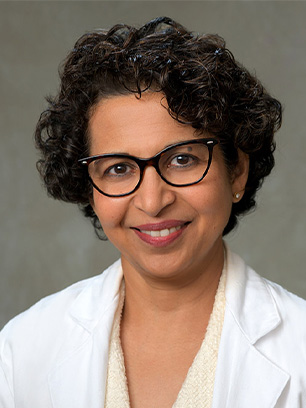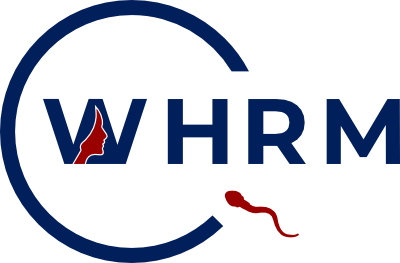
Anuja Dokras
Penn Fertility Care
3701 Market Street, Suite 800 adokras@obgyn.upenn.eduPhiladelphia, PA 19104
Fax: 215-349-5512
Research Area
Founder’s Professor in Women’s Health
Additional Appointment Titles
- Director, Penn Polycystic Ovary Syndrome
- Medical Staff: Attending, Hospital of the University of Pennsylvania, Obstetrics & Gynecology/Reproductive Endocrinology and Infertility
- Director, Penn Preimplantation Genetic Diagnosis program
- Director , HUP-Reproductive Surgical Facility, Philadelphia, PA
- Medical Staff: Active, Penn Presbyterian Medical Center (UPHS) Gynecology/Gynecology
- Director, Residency Research Program, Department of Obstetrics and Gynecology
- Medical Staff: Active, Pennsylvania Hospital, Obstetrics & Gynecology/Reproductive Endocrinology
- Director, Women’s Health Center for Clinical Innovation (WHCCI)
Education
- HSC (Science/Math)
Jaihind College, India, 1982. - MBBS (MD)
University of Bombay, India, 1988. - PhD (Medicine)
University of Oxford, UK, 1992. - MHCI (Healthcare Innovation )
University of Pennsylvania, 2022.
Post-Graduate Training
- Postdoctoral Research Fellow, Yale University School of Medicine, New Haven, CT, 1992-1993.
- Intern in Obstetrics and Gynecology, Yale New Haven Hospital, Yale University, New Haven, CT, 1993-1994.
- Resident in Obstetrics and Gynecology, Yale New Haven Hospital, Yale University, New Haven, CT, 1994-1997.
- Fellow in Reproductive Endocrinology and Infertility, Yale University School of Medicine, New Haven, CT, 1997-1999.
- Edward Cooper Leadership Development Program, Wharton, 2017-2017.
- Certiifcate in Health care Innovation, University of Pennsylvania, 2019-2020.
- Leadership in a new Era of Healthcare Program, Wharton, 2019-2019.
- Masters in Healthcare Innovation, University of Pennsylvania, 2020-2022.
Description of Research Expertise
Research Interests: Dr Dokras directs the Penn Polycystic Ovary Syndrome (PCOS) trans disciplinary research program.
Keywords: PCOS, androgens, metabolic risk, mood disorders, HRQOL
Research Details:
PCOS is the commonest endocrine disorder in reproductive age women with a prevalence of 8-15%. It is associated with significant gynecological, dermatologic, metabolic and psychiatric co-morbidities. Our research program has two main interests; understanding long term cardiovascular morbidity and risk of depression and anxiety disorders in PCOS. Both cardiovascular disease (CVD) and mood disorders are associated with significantly physical and emotional morbidity and add significantly to the financial burden of the healthcare system.
Our studies have shown that young women with PCOS have an increased risk of obesity, dyslipidemia, metabolic syndrome and subclinical atherosclerosis compared to age matched controls. We are currently interested in understanding the determinants of CVD risk by performing studies at both cellular level (lipid phenotyping, HDL function) and population levels (impact of steroid hormones on lipids, studying role of androgens in subclinical atherosclerosis). Some of these studies are conducted in collaboration with Dr Dan Rader.
Our second area of interest is to better understand the risk of lowered health related quality of life (HRQOL), and increased risk of anxiety and mood disorders in PCOS. We were among the first groups to comprehensively demonstrate a fourfold increased risk of depression and anxiety in PCOS. We are interested in understanding the impact of interventions such as lifestyle change, hormonal contraception, CBT on HRQOL, mood and anxiety disorders.
Description of Clinical Expertise
Dr Dokras directs the Penn PCOS center which offers comprehensive gynecological, reproductive, dermatological, metabolic, nutritional and psychological care to women with PCOS. The program is present at 3701 Market St and Penn Medicine at Radnor with nutrition services available on-site.
She also Directs the Preimplantation Genetic Diagnosis program at Penn Fertility Care.
Selected Publications
Alur-Gupta Snigdha, Chemerinski Anat, Liu Chang, Lipson Jenna, Allison Kelly, Sammel Mary D, Dokras Anuja: Body-image distress is increased in women with polycystic ovary syndrome and mediates depression and anxiety. Fertility and sterility 112(5): 930-938.e1, Aug 2019.
Alur-Gupta S, Dokras A.: Polycystic ovary syndrome: is the cardiometabolic risk increased after menopause? Menopause 26(3): 331-333, March 2019.
Dokras A.: Does body weight affect cardiometabolic risk in women with polycystic ovary syndrome? Fertil Steril 111(1): 56-57, Jan 2019.
Teede Helena J, Misso Marie L, Boyle Jacqueline A, Garad Rhonda M, McAllister Veryan, Downes Linda, Gibson-Helm Melanie, Hart Roger J, Rombauts Luk, Moran Lisa, Dokras Anuja, Laven Joop, Piltonen Terhi, Rodgers Raymond J, Thondan Mala, Costello Michael F, Norman Robert J: Translation and implementation of the Australian-led PCOS guideline: clinical summary and translation resources from the International Evidence-based Guideline for the Assessment and Management of Polycystic Ovary Syndrome. The Medical journal of Australia 209 Suppl 7: S3-S8, Oct 2018.
Cooney LG, Dokras A.: Beyond fertility: polycystic ovary syndrome and long-term health. Fertil Steril. 110(5), Oct 2018.
Dokras, Anuja: Improving care for women with polycystic ovary syndrome. Fertil Steril 110(1): 50-51, July 2018.
Dokras A, Witchel SF: Are Young Adult Women with Polycystic Ovary Syndrome Slipping through the Healthcare Cracks? J Clin Endocrinol Metab 99(5): 1583-1585, Feb 2014 Notes:
Roe A, Hillman J, Butts S, Smith M, Rader D, Playford M, Mehta NN, Dokras A.: Decreased cholesterol efflux capacity and atherogenic lipid profile in young women with PCOS. J Clin Endocrinol Metabol 99(5): E841-847, Feb 2014 Notes:
Legro RS, Dodson WC, Kris-Etherton PM, Kunselman AR, Stetter CM, Williams NI, Gnatuk CL, Estes SJ, Fleming J, Allison KC, Sarwer DB, Coutifaris C, Dokras A: Randomized Controlled Trial of Preconception Interventions in Infertile Women With Polycystic Ovary Syndrome. J Clin Endocrinol Metab 100(11): 4048-4058, Nov 2015.
Dokras A, Sarwer DB, Allison KC, Milman L, Kris-Etherton PM, Kunselman AR, Stetter CM, Williams NI, Gnatuk CL, Estes SJ, Fleming J, Coutifaris C, Legro RS: Weight Loss and Lowering Androgens Predict Improvements in Health-Related Quality of Life in Women with PCOS. J Clin Endocrinol Metab 101(8): 2966-2974, 2016.
Gibson-Helm M, Teede H, Dunaif A, Dokras A: Delayed diagnosis and a lack of information associated with dissatisfaction in women with polycystic ovary syndrome. J Clin Endocrinol Metab 102(2): 604-612, Feb 2017.
Legro RS, Dodson WC, Kunselman AR, Stetter CM, Kris-Etherton PM, Williams NI, Gnatuk CL, Estes SJ, Allison KC, Sarwer DB, Diamond MP, Schlaff WD, Casson PR, Christman GM, Barnhart KT, Bates GW, Usadi R, Lucidi S, Baker V, Zhang H, Eisenberg E, Coutifaris C, Dokras A: Benefit of delayed fertility therapy with preconception weight loss over immediate therapy in obese women with PCOS. J Clin Endocrinol Metab 101(7): 2658-2666, Jul 2016
Dokras A, Saini S, Gibson-Helm M, Schulkin J, Cooney L, Teede H: Gaps in knowledge among physicians regarding diagnostic criteria and management of polycystic ovary syndrome. Fertil Steril May 2017 Notes: [Epub ahead of print]
Dokras A, Playford M, Kris-Etherton PM, Kunselman AR, Stetter CM, Williams NI, Gnatuk CL, Estes SJ, Sarwer DB, Allison KC, Coutifaris C, Mehta N, Legro RS: Impact of hormonal contraception and weight loss on high-density lipoprotein cholesterol efflux and lipoprotein particles in women with polycystic ovary syndrome. Clin Endocrinol 86(50): 739-746, May 2017.
Tessa Copp1, Jesse Jansen1,Jenny Doust, Ben W. J. Mol, Anuja Dokras, Kirsten McCaffery1: Polycystic ovary syndrome controversy: are expanding disease definitions unnecessarily labelling women with PCOS? British Medical Journal 358, Aug 2017.
Copp T, Jansen J, Doust J, Mol BW, Dokras A, McCaffery K: Are expanding disease definitions unnecessarily labeling women with polycystic ovary syndrome? BMJ 358: j3694, Aug 2017 Notes: Erratum in: BMJ, Nov 2017, 359: j5380.
Dokras A, Stener-Victorin E, Yildiz BO, Li R, Ottey S, Shah D, Epperson N, Teede H.: Androgen Excess-Polycystic Ovary Syndrome Society: position statement on depression, anxiety, quality of life, and eating disorders in polycystic ovary syndrome. Fertility and Sterility 109(5): 888-899, May 2018.
Teede HJ, Misso ML, Costello MF, Dokras A, Laven J, Moran L, Piltonen T, Norman RJ; International PCOS Network: Recommendations from the international evidence-based guideline for the assessment and management of polycystic ovary syndrome. Fertil Steril. July 2018.

